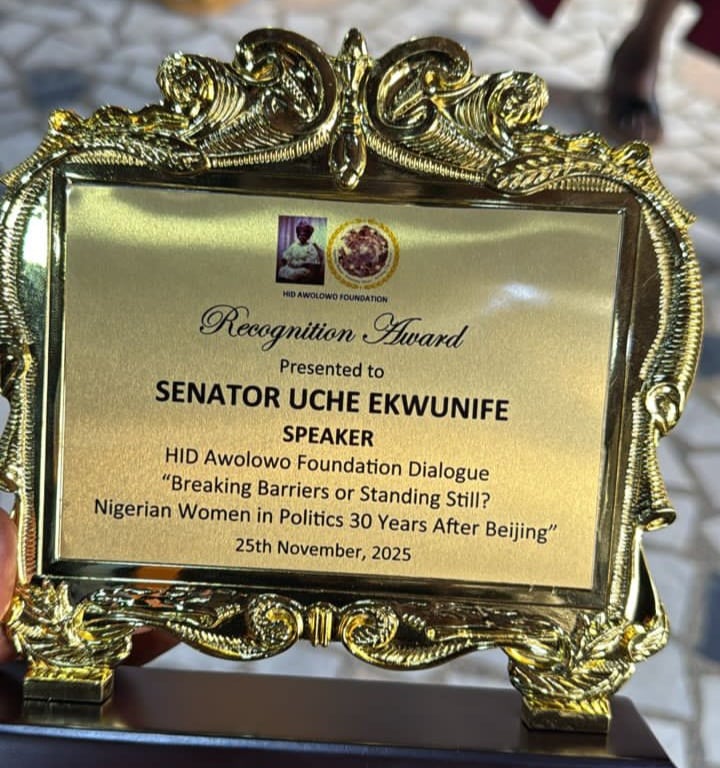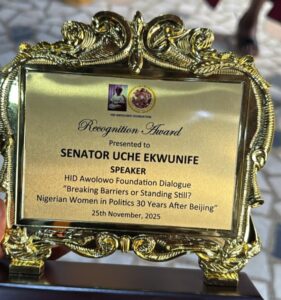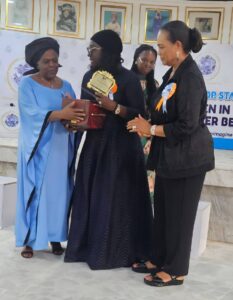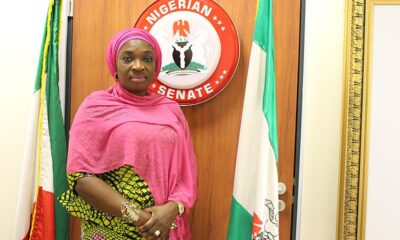NEWS
Sen. Ekwunife Honoured, Delivers Powerful Speech at 2025 Awolọwọ Dialogue (See Pictures)
Published
2 months agoon

Most Distinguished Senator Uche Lilian Ekwunife, PhD, CON, delivered a powerful address yesterday, 25th of November, at the 2025 HID Awolọwọ Foundation Dialogue, where she was also honoured with an award in recognition of her contributions to national development and her unwavering advocacy for women in governance.

The Dialogue, established in memory of the Late Chief (Mrs) HID Awolọwọ, is dedicated to advancing gender inclusion and driving political reform across Nigeria. This year’s event was held in Ikenne, Ogun State, attracting a distinguished audience of traditional rulers, activists, scholars, women leaders, and policy influencers.

Senator Ekwunife was selected to speak based on her outstanding leadership record and her consistent voice for women’s political participation.
Her keynote address—delivered under the theme “Breaking Barriers or Standing Still? Nigerian Women in Politics 30 Years After Beijing”, with a sub-theme “Women in Power: Lived Experiences”—painted a frank picture of the systemic hurdles facing Nigerian women in public office.


She described the nation’s current level of female representation—less than 10% of elective positions—as a “democratic deficit,” calling attention to stalled gender bills, patriarchal party structures, and the persistent misogyny women encounter in the political arena.
Below is the full text of Senator Uche Ekwunife’s speech as delivered at the event:
Speech by Senator Uche Lilian Ekwunife (IYOM), PhD, CON at the HID Awolọwọ Foundation Dialogue 2025, Ikenne, Ogun State.
Theme: “Breaking Barriers or Standing Still? Nigerian Women in Politics 30 Years After Beijing.”
Sub-theme: “Women in Power: Lived Experiences — In Her Own Words: Stories from Women Who Led or Tried To.”
⸻
Protocol
The Convener and Executive Director of the HID Awolọwọ Foundation, Ambassador Dr. O. Awolọwọ Dosumu; distinguished dignitaries; eminent scholars; panelists; traditional rulers; activists; fellow women leaders; gentlemen of the press; and all resilient women and men gathered here today, good morning.
⸻
To stand here in Ikẹnnẹ, the home of Chief Obafemi Awolọwọ and Yeye Oodua, Chief (Mrs.) HID Awolọwọ, is a privilege that carries both emotional depth and intellectual gravity. This is not just a town; it is a crucible of national history, a place where ideas were nurtured, policies were shaped, and leadership was modelled with clarity of purpose.
Yeye Oodua’s life remains a curriculum in discipline, courage, partnership, and political sagacity. Her influence envelops us today like a mantle of wisdom. And under this canopy of legacy, we gather to confront a question that demands honesty and courage:
Thirty years after the Beijing Declaration, are Nigerian women breaking barriers or standing still? This question challenges us to measure progress with candour, and to acknowledge, without sentiment, the distance that remains.
⸻
Where We Stand
The 1995 Beijing Declaration stands as the world’s most ambitious blueprint for gender equality. It placed women’s rights at the centre of global development and insisted that women must be present wherever power is exercised.
Nigeria signed that commitment. Yet, thirty years later, the results are sobering:
• Women still hold less than 10% of elective offices.
• Under 5% of seats in the Senate are occupied by women.
• Only around 8% in the House of Representatives.
• Across 36 states, only four deputy governors are women.
For a nation where women constitute nearly half the population, these figures reflect not just an imbalance—they represent a democratic deficit.
Gender-responsive bills struggle to survive. The Gender Equality Bill has been rejected three times in ten years. Bills on affirmative action, inheritance rights, and protections for political participation face persistent resistance.
Political parties—the true gatekeepers of democracy—remain the biggest bottlenecks. They determine who gets the ticket, the funding, the support structures, and the winnable constituencies.
Yet, no major political party in Nigeria today is led by a woman. The National Interest Party (NIP), once chaired by Eunice Atuejide—a rare example of female party leadership—was deregistered after the 2019 general elections. Today, Nigeria has zero active major parties chaired by women.
This is not coincidental. It is structural.
The political terrain—tainted by violence, monetisation, disinformation, and misogyny—deters women disproportionately. Women face online harassment, character assassination, moral policing, and gendered attacks that their male counterparts seldom endure.
⸻
The Truth
We have made progress, but progress is not parity.
Visibility is not victory.
Representation is not yet real power.
Nigeria is not short of capable women—only short of systems that let them lead.
⸻
Yet Women Rise
Globally, women like Dr. Ngozi Okonjo-Iweala and Dr. Amina Mohammed show that Nigerian excellence knows no gender.
From all corners of Nigeria, women like Senator Oluremi Tinubu, Senator Daisy Ehanire Danjuma, Senator Franca Afegbua (the first elected woman senator in Nigeria), Senator Joy Emodi (First female Senator in South East Nigeria), Hon. Abike Dabiri-Erewa, Senator Grace Folashade Bent, Her Excellency Dame Virgy Etiaba (Nigeria’s first female Governor), Prof. Dora Akunyili and many others have shaped national policy and governance.
In the corporate world, trailblazers such as Folorunsho Alakija, Dr. Stella Okoli, Mo Abudu, and Dr. Adaora Umeoji, the first female GMD of Zenith Bank, demonstrate that Nigerian women excel in every arena.
These achievements reaffirm a timeless truth: Nigeria’s challenge has never been women’s competence—it has been access, opportunity, and institutional support.
⸻
My Own Journey
My own story—from the banking hall to the Senate chambers—is a small thread in this larger fabric.
In banking, I rose from Branch Manager to Head of the Public Sector Unit. It was a world of exacting targets, strategic decisions, and sustained pressure. Yet I remained a wife and mother, balancing bedtime prayers with boardroom reports. Leadership for women is rarely linear; it is often a delicate negotiation of competing priorities.
When I transitioned into politics, I realised the bias was even sharper. In my recent experience as Deputy Gubernatorial Candidate in Anambra State, I faced attacks rooted not in policy, but in gender.
My ambition was labelled “over-ambition.”
My independence was painted as defiance.
My gender became a tool for political warfare.
During a parliamentary debate on electoral reform, a male colleague shouted: “Women should stay at home, not in the chambers!” I stood up and replied calmly:
“Our home is wherever we choose to be.
Today, my home is here shaping the laws of the Federal Republic of Nigeria.”
That exchange captures the lived experience of countless Nigerian women in politics—not only fighting for office, but fighting the prejudice that questions their right to aspire.
Yet we persist—not for personal ambition, but to redefine leadership for the young girls watching from classrooms and homes across Nigeria.
As Chair of the Senate Committee on Science, Technology and Innovation, I led the historic approval of first-line charge funding for NASENI after 33 years. That reform strengthened Nigeria’s innovation ecosystem and affirmed what is already clear:
When women lead, they deliver.
⸻
The Power of Imagination
I often ask young women: “What do you see when you imagine your country?” Because the future we cannot imagine, we cannot build.
Let us imagine a Nigeria where:
• Half of National Assembly seats are held by women;
• Every state proudly counts women in its executive and legislature;
• Women chair major committees — defence, finance, petroleum, national planning;
• A woman president is no longer a dream, but a normal possibility.
Imagine, for a moment, a Nigeria led by women of proven excellence — a President like Dr. Ngozi Okonjo-Iweala and a Vice President like Amina Mohammed. Their track records in global finance, diplomacy, and governance give us a glimpse of what bold, ethical, and transformative leadership could deliver in just four years.
Around the world, evidence shows that countries with higher levels of women in leadership enjoy stronger economic growth, lower corruption, better social outcomes, and greater political stability. This is not speculation — it is data.
And when we say a woman cannot lead, we forget a simple truth: every president, every leader, every nation-builder was brought into this world by a woman. If women are trusted to raise leaders, why should they not be trusted to be leaders themselves?
Imagination must translate into policy, party reform, constitutional review, and cultural change. Our goal is not to replace men, but to ensure leadership reflects our full national capacity. A nation cannot walk on one leg; neither can it think with half its brain.
Inclusion is not charity—it is smart governance. Nigeria cannot prosper while half its talent is excluded.
⸻
The Work Ahead
The Beijing Platform offered a global framework. But frameworks do not implement themselves.
We must now do the heavy lifting:
• Government must reform beyond rhetoric.
• Political parties must embrace gender equity as a democratic imperative.
• Institutions must treat inclusion as a strength.
• Women must claim their space.
• Men of conscience must act as allies.
Institutions should establish and enforce comprehensive policies that safeguard women from discrimination, harassment, and violence in both public and private settings.
Let this Dialogue not end as another elegant conversation that fades at the door. Let it become a renewed covenant with Nigerian women.
⸻
Eight Proposals for Action
1. A Women-in-Politics Accountability Charter for all political parties, with measurable inclusion targets and public scorecards.
2. A National Women’s Shadow Parliament to monitor and contribute to legislative debates from a gender perspective.
3. A Diaspora Women Policy Bridge connecting the expertise of Nigerian women abroad with national reforms.
4. Mandatory gender-sensitivity and anti-bias training for elected officials, senior civil servants, and party executives.
5. A national narrative-shaping initiative to elevate stories of women in leadership at all levels.
6. Dedicated federal and state budget lines for women’s leadership development.
7. Enforceable safety protocols guaranteeing secure political participation for female candidates.
8. Before the next election cycle, every major political party should publish its gender inclusion targets and annual progress reports. Accountability must begin now.
⸻
Honouring HID Awolọwọ
How fitting that these reflections honour a woman who embodied the principles of the Beijing Declaration long before it existed. Chief Awolọwọ called his wife a “jewel of inestimable value.” He spoke truth.
Mama HID was not just a spouse; she was a strategist, an organiser, a leader, a stabilising force, a silent power in public life. She stood beside her husband, not behind him—shaping history with her strength, her intellect, and her quiet authority.
Her life reminds us that leadership is strongest when shared, and that when women rise, families, communities, and nations rise with them.
⸻
Closing
As we conclude, let us anchor ourselves on the four pillars of this Dialogue:
• Reflect on how far we have come since Beijing and since HID Awolọwọ’s era.
• Reclaim the spaces and narratives that are ours by right.
• Reimagine a Nigeria where women’s leadership is normal, not exceptional.
• Reform our laws, institutions, parties, cultures, and mindsets.
Thirty years after Beijing, the real question is not whether barriers remain—they do.
The question is whether the next thirty years will look like the last.
I believe they will not.
I believe Nigerian women will not stand still.
We will rise.
We will lead.
We will transform this nation.
Thank you all for listening and God bless the Federal Republic of Nigeria.
Vincent Onyegaegbochi Okoye (born 23rd April) is a Nigerian blogger, writer, entrepreneur and a librarian. Born and raised in a Catholic Family from NRI in anaocha local Government Area of Anambra state, Nigeria, Graduated from Delta state university, Abraka, in the year 2018 where he studied Library and Information Science.

You may like

SO SAD!! Super Eagles Winger, Samuel Chukwueze Loses Mom

Police Bust Human Trafficking Ring in Enugu, Rescue One

Soludo Warns Traders Over Main Market Closure: ‘Don’t Push Me to Demolish It

Enugu Police Arraign Man, 42 over Alleged Rape of Girl, 13

Grassroots Governance Repositioned: Enugu Aligns Town Unions with Governor Mbah’s Development Vision

Police Arraign Man Over Alleged Cyberbullying of Enugu SSG

BREAKING: Sit-at-home: Soludo shuts Onitsha Main Market, threatens one-month closure

Aka Eze Aka Steps Up Sanitation Drive, Desilts Key Obollo Afor–Orba Drainage

Enugu Govt Recovers ₦1.28bn from Sujimoto as EFCC Hands Over Cheques, Vows Further Recoveries

Ohanaeze Fixes Last Saturday of January for Igbo Adoration, Thanksgiving Day

Enugu Govt, Rotary Int’l Flag Off 15-Day Free Medical Mission at SUMAS Teaching Hospital

Tinubu leads Nigerians to observe 2026 Armed Forces Celebration, Remembrance Day
Trending
-

 NEWS2 years ago
NEWS2 years agoA MUST READ!! What Peter Obi Discussed With Atiku, Saraki, Lamido During Visits – Aide Reveals
-

 MUSIC4 years ago
MUSIC4 years agoMUSIC: Mohbad – Back Side [Free Download]
-

 MUSIC4 years ago
MUSIC4 years agoMUSIC: Papiwizzy – Oluwalonsola Ft Zlatan and Papisnoop [Download Mp3]
-

 MUSIC2 years ago
MUSIC2 years agoMUSIC: DEBHIE FEAT. EMMYBLAQ – TURN UP (DOWNLOAD HERE)

